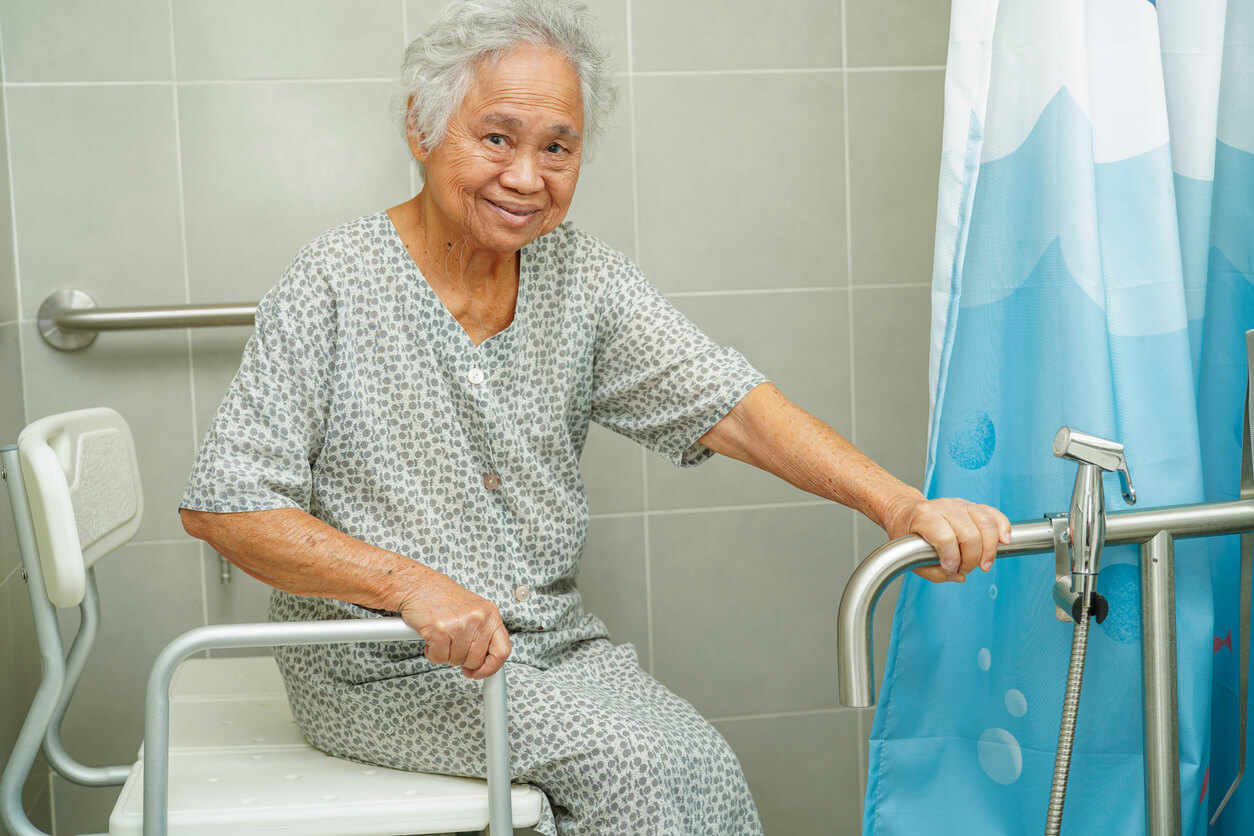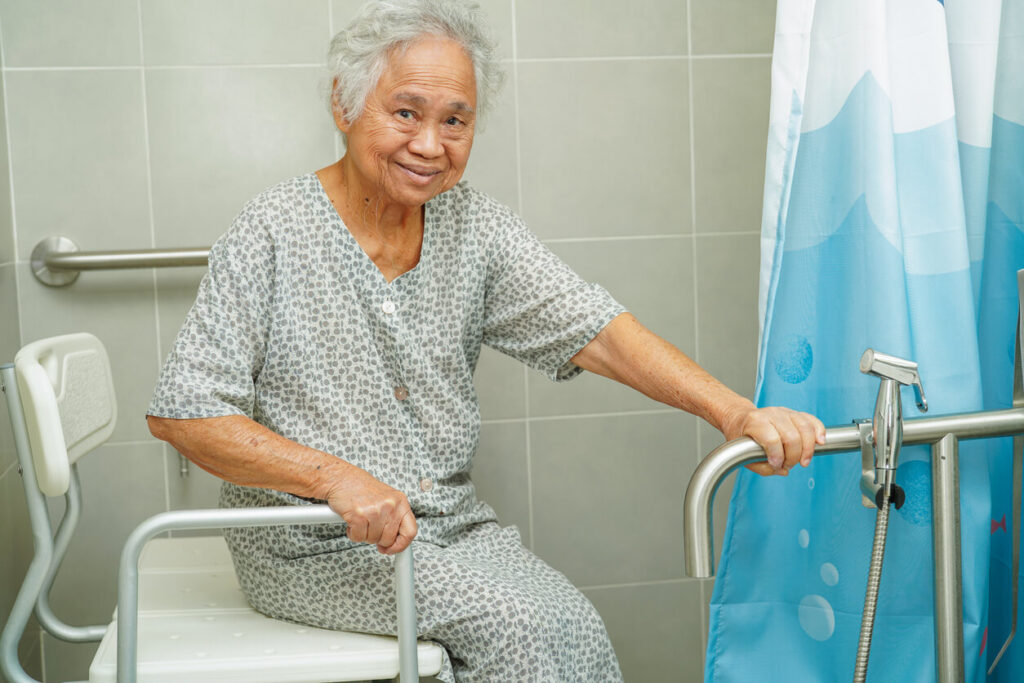June 13, 2025

Does Home Health Help With Bathing? Elderly Care Guide
As our loved ones age, even simple activities like bathing can become difficult and sometimes unsafe. Limited mobility, health conditions, or fear of slipping can make bathing stressful rather than relaxing. For seniors and individuals who struggle with these daily tasks, finding help is vital for maintaining personal hygiene and dignity. That’s why families often turn to home care aides for professional bathing support.
In this article, we’ll discuss how home care professionals provide bathing assistance for seniors and people with disabilities. From helping with transfers to ensuring safety and comfort, we’ll explain how these compassionate aides make hygiene more manageable—right at home.
Benefits of Hiring a Home Health Aide for Bathing Seniors
Does home health give baths? Yes, and these services offer seniors a range of valuable advantages. Hiring a home care assistant provides much more than simple help with routines—it brings safety, reassurance, and relief to seniors and their loved ones.
Here’s a closer look at the distinct benefits of trusting a trained professional with this essential task:
Accident Prevention and Safety
Bathrooms present slip and fall risks, especially for those with limited mobility. Support staff assist with navigating the shower or tub, using grab bars, non-slip mats, and proper techniques. Their presence significantly lessens the likelihood of injuries.
Personalized and Respectful Care
Home care providers recognize the sensitivities involved in bathing. They offer gentle assistance while protecting each person’s privacy and modesty. By tailoring each routine to the individual’s preferences, they help clients feel secure and respected during a vulnerable process.
Consistent Hygiene and Well-Being
Regular bathing helps maintain healthy skin, minimize infection risks, and prevent other complications. With ongoing help, seniors are able to keep up with hygiene tasks such as washing, oral care, and grooming, ultimately supporting their comfort and wellness.
Early Detection of Health Concerns
Personal care staff become familiar with their clients’ routines and are often the first to spot skin changes, injuries, or emerging health issues during their work. Promptly sharing these observations enables families and healthcare providers to act early and avoid more serious problems.
Boosting Confidence and Self-Reliance
Receiving skilled, supportive bathing help at home can empower seniors to remain engaged in their daily lives. This assistance fosters greater self-worth and allows older adults to preserve as much independence as possible, rather than feeling reliant on family or institutional care.
Peace of Mind for Families
Knowing a trained aide is assisting with such an important activity brings relief to family caregivers. It ensures loved ones are well cared for even when relatives are unable to be present, reducing anxiety and allowing families to focus on other responsibilities.
Does Home Health Care Help With Bathing? Step-By-Step Process
Now that we’ve covered the main benefits, let’s look at the thoughtful approach support staff use to help seniors bathe safely and comfortably:
1. Preparing the Bathing Environment
Caregivers check if the bathroom is safe, comfortable, and well-equipped. This includes gathering towels, soap, washcloths, and clean clothing and warming the room to prevent chills. Safety precautions—like adding non-slip mats, securing grab bars, and setting up a shower chair—are also put in place to minimize the risk of slips or falls. Thoroughly preparing the environment helps caregivers set the stage for a smooth and hazard-free bath.
2. Assisting With Undressing and Maintaining Privacy
Next, caregivers offer respectful assistance with undressing while prioritizing the individual’s dignity and modesty. They provide minimal or comprehensive bathing help for elderly clients, allowing for independence whenever possible. Caregivers protect privacy and reduce feelings of vulnerability by using towels or robes to shield the person’s body.
3. Safe Transfer and Support During Bathing
If mobility is an issue, caregivers carefully support the individual when transferring to the tub, shower seat, or bathing chair. They may even use mobility aids or lifts if necessary. Throughout the bathing process, they can help with washing, rinsing, and shampooing—always tailoring their support to the client’s level of ability.
Special care is taken to clean hard-to-reach areas, adjust water temperature, and minimize exposure to drafts to achieve thorough hygiene and overall comfort. Caregivers regularly check in with the client, moving at a pace that suits their preferences and making adjustments if any discomfort or anxiety arises.
4. Drying, Dressing, and Post-Bath Hygiene
After bathing, caregivers gently help with drying, while being attentive to areas prone to moisture buildup to prevent irritation or infection. They then assist the individual dress in fresh clothing or a robe, and can also assist with grooming tasks like hair drying, oral care, or applying moisturizer. Privacy and comfort are maintained throughout, so the person feels clean, refreshed, and cared for.
5. Cleaning Up and Restoring the Environment
Finally, caregivers tidy up the bathroom—disposing of used towels, wiping up any water, and resetting equipment or supplies. This ensures the area is left clean, dry, and safe for future use, providing peace of mind and a seamless transition to the rest of the individual’s day.
Preparation Tips Before Hiring Bathing Services
Before hiring professional bathing services, it’s important to prepare thoughtfully for a safe and respectful experience for your loved one. Taking these preparatory steps helps both the caregiver and the individual feel confident and supported throughout the process.
Here are some essential tips to consider before arranging bathing assistance:
- Assess Individual Needs. Consider the person’s mobility, support requirements, medical conditions, and preferences. This ensures the chosen provider is a good fit.
- Understand Service Scope. Clarify what the service includes—whether support extends to grooming, toileting, or dressing in addition to bathing—so expectations are clear.
- Prepare the Bathing Area. Remove obstacles, install necessary safety features, and ensure any special equipment is ready to use to minimize risk.
- Have Supplies Ready. Place soap, towels, suitable clothing, and any preferred products within easy reach to streamline the process.
- Share Preferences and Privacy Concerns. Inform the home health agency of routines, privacy wishes, and any relevant details like preferred time of day or aide gender to create a personalized experience.
- Review Medical Information and Emergency Plans. Ensure aides have up-to-date health information, allergies, and emergency contact details.
- Set a Consistent Schedule. Arrange regular times and try to work with the same assistant for greater comfort and continuity.
Give Your Loved Ones an Exceptional Bathing Experience by Choosing Stay At Home Homecare
Ensuring seniors or individuals with disabilities receive proper bathing assistance is vital for their health, dignity, and quality of life. Professional home care aides provide not only practical help but also companionship and compassionate support with this challenging daily routine. With the right preparation and trained caregivers, families remain confident their loved ones are being cared for in a respectful, comfortable, and personalized manner.
If you’re looking for reliable bathing assistance or in-home care for your loved one, Stay At Home Homecare can help. Our caregivers focus on providing safe, respectful, and individualized support right at home. Our team is dedicated to helping seniors maintain their independence and well-being by offering regular help with bathing, assistance with daily routines, and specialized personal care.
Contact us to learn more about how our services can bring comfort and security to your family.

